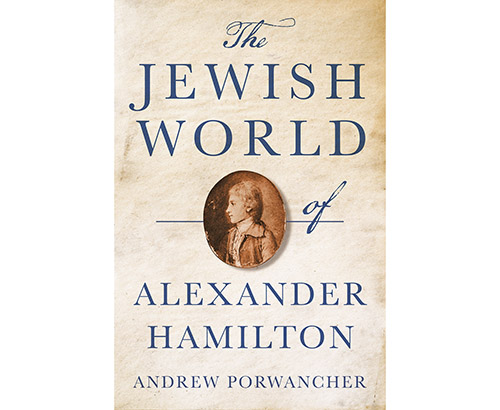
Alexander Hamilton, whose image as a leading Founding Father has been under a recent spotlight thanks to Lin-Manuel Miranda’s hit Broadway musical, has an undeniable history of standing up to antisemites and cultivating strong relationships with the Jewish community in Colonial America.
But was he himself Jewish?
If you ask Dr. Andrew Porwancher, the answer is a firm “probably.”
The Ernest May fellow at Harvard University and the Wick Cary associate professor at the University of Oklahoma has conducted extensive research on Hamilton for his book “The Jewish World of Alexander Hamilton,” published by Princeton University Press.
“My case for Hamilton being Jewish is problematic,” he acknowledged during a February 23 virtual “Touro Talk”s program with Dr. Alan Kadish, president of the Touro University system, added that the claims of Hamilton’s religious identity “fall short of certainty.”
“But looking at the evidence I do have, I do, in fact, believe that Hamilton was born and raised Jewish in his Caribbean community,” said Porwancher, a Princeton native.
Hamilton was born out of wedlock and had the last name of his father, a Scotsman named James Hamilton who was never a part of his life. However, the evidence would indicate that his mother, Rachel Faucett—although not born Jewish—previously converted to marry Johann Michael Levine.
Lending further credence to the belief Hamilton was born Jewish are statements by Hamilton’s own grandson that Levine was Jewish, said Porwancher.
Growing up on the island of Nevis, which at the time was 25% Jewish, Hamilton told his children that as a small child he could stand on a desk and look his teacher in the eye and recite the Ten Commandments in Hebrew.
“She (his mother) enrolled Alexander in a Jewish school, and Jewish schools only enrolled Jewish students,” said Porwancher. “Jewish schools are religious instruments to turn students into Jewish adults … to instill a shared sense of Jewish peoplehood. … We have good cause to think a Jewish school would not have educated Alexander Hamilton unless they considered him one of their own.”
Unfortunately, Hamilton’s Jewish education ended at age 11 when he moved to the Caribbean island of St. Croix, which had no Jewish schools. He arrived in America at age 18.
Porwancher said he suspected Hamilton abandoned his Jewish identity while in his teens and “unquestionably” adopted a Christian identity. Yet, the author’s research leads him to believe it was done to fit into society and that Christianity was always kept “at arm’s length” throughout Hamilton’s life. Even after marrying a religious woman, he never joined her church and never took communion until on his deathbed; Porwancher believes he did do only to give his wife comfort.
Hamilton arrived at the dawn of the American Revolution and was forced to drop out of college. He joined the Continental Army, fighting bravely in the battles of Princeton and Trenton, among others, and proved to be a brilliant military commander. He captured the attention of George Washington, who gave him a position on his staff.
Hamilton later went to law school and passed the New York Bar. He “rode Washington’s coattails” into the new government and was appointed at a young age to be the first Secretary of the Treasury. It was through his legal practice and becoming “the patron of Wall Street” that he forged most of his relationships with the Jewish community, according to Porwancher.
Hamilton found commonality with the Jewish community, then concentrated in Eastern port cities. Like him they largely supported the Revolution and Hamilton, a primary author of the Federalist Papers, found himself aligned with the Jewish community on ratification of the Constitution.
“In 1787, Jews had no reason to believe that a document that wouldn’t discriminate against Jews would be drafted,” said Porwancher. After all, many state constitutions required office holders be Christian. The idea that any country would have a written document that allowed Jews and others to be appointed or elected to office was considered “radical.”
“We have this incredible step forward for religious equality and Jews were on the same side as Hamilton,” who, Porwancher said, stood firmly against the antisemites opposing the Constitution’s ratification and who were using the classic trope that “you will be ruled by Jews” on which to base their objections.
Hamilton, beyond a likely mutual religious identity, shared much more with the Jewish community. Many like him were also immigrants and outsiders, were urban rather than rural, were involved in business, commerce and maritime trades, and survived by their wits.
As treasury secretary, said Porwancher, it was Hamilton who ensured that the promise of equality could become a reality by figuring out how to rescue a fledgling country so mired in debt that even the Founding Fathers feared it might not survive by enacting such initiatives as a new form of currency, a credit system and a national bank. There Hamilton formed another alliance with the Jewish community, many of whom were involved in banking and finance.
Hamilton continued to take up the cause of defending Jews. He put a Jew on the board of Columbia University, the first time there had ever been a Jewish member on any American college board, and got the institution to do away with mandatory Christian worship for students.
Later after going into law practice in New York he had many Jewish merchants as clients.
“He becomes a vigorous champion of American Jews,” said Porwancher, and in a case where the opposition claimed Hamilton’s witnesses weren’t trustworthy because they were Jewish, Hamilton “delivers the most radical denunciation of antisemitism of any Founding Father” and “an historical moment in the Jewish struggle for equality” by confronting and laying to rest the antisemitic trope that Judaism encourages lying under oath.
“Because he is so aligned with Jews, Hamilton comes under criticism,” remarked Porwancher. “Even though Hamilton does not identify as Jewish he suffers more antisemitism than many Jews. It is a testament to Hamilton that he was so maligned.”
By Debra Rubin













